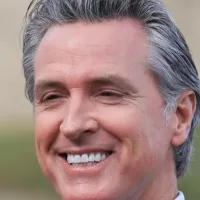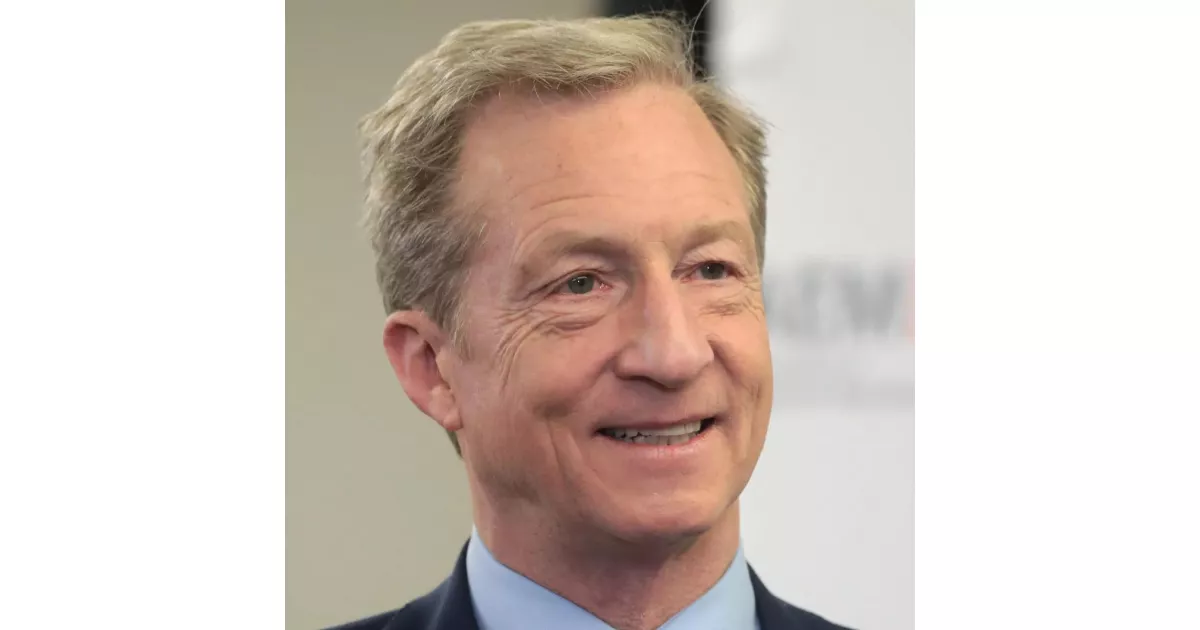Tom Steyer is an American businessman, hedge fund manager, philanthropist, environmentalist, and political activist. He founded Farallon Capital, a $20 billion investment firm, and co-founded Beneficial State Bank, a community development bank. Steyer has been actively involved in political and environmental causes, advocating for climate action and liberal policies. He served on Stanford University's board of trustees and was a partner at Hellman & Friedman, a private equity firm.
June 27, 1957: Tom Steyer's Birth
On June 27, 1957, Thomas Fahr Steyer was born. He is an American climate investor, businessman, hedge fund manager, philanthropist, environmentalist, political candidate, and liberal activist.
1979: Start of career at Morgan Stanley
In 1979, Tom Steyer began his professional career at Morgan Stanley.
1983: Work at Goldman Sachs
In 1983, Tom Steyer began working at Goldman Sachs as an associate in the risk arbitrage division.
1983: Working on Walter Mondale's campaign
In 1983, Tom Steyer worked on Walter Mondale's presidential campaign.
1985: Departure from Goldman Sachs
In 1985, Tom Steyer worked until this year as an associate in the risk arbitrage division at Goldman Sachs.
January 1986: Founding of Farallon Capital
In January 1986, Tom Steyer founded Farallon Capital, a hedge fund firm headquartered in San Francisco.
August 1986: Steyer married Kathryn Ann Taylor
In August 1986, Tom Steyer married Kathryn Ann Taylor. The ceremony was performed by Reverend Richard Thayer and Rabbi Charles Familant. They have four children.
2000: Raising money for Bill Bradley
In 2000, Tom Steyer raised money for Bill Bradley.
2004: Delegate to the Democratic National Convention
In 2004, Tom Steyer served as a delegate to the Democratic National Convention.
2006: Global Warming Solutions Act
In 2010, Tom Steyer co-chaired the 'No on Prop. 23' campaign in California, which aimed to prevent the overturning of California's Global Warming Solutions Act of 2006.
2007: Founding of Beneficial State Bank
In 2007, Tom Steyer and Kat Taylor founded Beneficial State Bank, a community development bank serving underserved Bay Area businesses, nonprofits, and individuals.
2007: Appointment to Stanford University Board of Trustees
In 2007, Tom Steyer began his service on the board of trustees at Stanford University.
2008: Steyer created the TomKat Center for Sustainable Energy
In 2008, Tom Steyer and Taylor gave $41 million to create the TomKat Center for Sustainable Energy at Stanford University, focused on developing affordable renewable energy technologies and promoting public policies for accessibility.
2008: Becoming a prolific fundraiser for Barack Obama
In 2008, Tom Steyer became one of Barack Obama's most prolific fundraisers after initially supporting Hillary Clinton.
2008: Consideration for Secretary of Treasury
In 2008, after Obama's victory, Tom Steyer was considered for appointment as Secretary of Treasury.
August 2010: Signing onto The Giving Pledge
In August 2010, Tom Steyer and his wife signed onto The Giving Pledge, an initiative of Bill Gates and Warren Buffett, committing to give away the majority of their wealth to philanthropic causes.
2010: Signing of The Giving Pledge
In 2010, Tom Steyer and his wife committed to donating half of their fortune to charity during their lifetime by signing The Giving Pledge.
2010: Co-chairing No on Prop. 23 campaign
In 2010, Tom Steyer co-chaired the 'No on Prop. 23' campaign in California, which aimed to preserve the AB32 climate change law.
2010: Steyer opposed Citizens United v. FEC
In a November 2014 interview, Tom Steyer said that he opposes Citizens United v. FEC, the 2010 Supreme Court decision allowing unlimited corporate donations to super PACs.
2011: Joining the board of Next Generation
Around 2011, Tom Steyer joined the board of Next Generation, a nonprofit focused on children's issues and the environment.
2011: Founding of Advanced Energy Economy
In 2011, Tom Steyer co-founded Advanced Energy Economy, an energy research and lobbying group.
2011: Steyer received Phillip Burton Public Service Award
In 2011, Tom Steyer received the Phillip Burton Public Service Award of Consumer Watchdog for his environmental work.
October 2012: Stepping Down from Farallon Capital
In October 2012, Tom Steyer stepped down from his position at Farallon Capital to focus on advocating for alternative energy.
2012: Speech at the Democratic National Convention
In 2012, Tom Steyer gave a speech at the Democratic National Convention, advocating for Obama's energy policies and criticizing Mitt Romney's stance on fossil fuels.
2012: Hosting a fundraiser for President Obama
In 2012, Tom Steyer hosted a fundraiser at his home for President Obama and pressed him on the Keystone pipeline issue.
2012: Steyer received Environmental Leadership Award
In 2012, Tom Steyer received the Environmental Leadership Award of the California League of Conservation Voters for his environmental work.
2012: Retirement from Farallon Capital
In 2012, Tom Steyer retired from his position at Farallon Capital after selling his stake in the company.
2012: Sponsoring Proposition 39
In 2012, Tom Steyer sponsored Proposition 39 in California, which sought to close a tax loophole to fund clean-energy infrastructure.
2012: Steyer focused on Keystone Pipeline
In 2012, after conversations with Bill McKibben, Tom Steyer focused on the Keystone Pipeline. He officially left Farallon in 2012.
January 2013: Rumors of being named Energy Secretary
In January 2013, rumors circulated that Tom Steyer might be named as a replacement for Energy Secretary Steven Chu, and Steyer indicated he would accept such an appointment.
February 2013: Speaking at Anti-Keystone XL Pipeline Rally
In February 2013, Tom Steyer spoke at an anti-Keystone XL Pipeline rally on the Washington Mall.
September 2013: Steyer appeared in commercials opposing the Keystone pipeline
In September 2013, Tom Steyer appeared in a series of commercials in opposition to the proposed Keystone pipeline.
October 2013: Steyer launched the Risky Business Project
In October 2013, Tom Steyer, along with Michael Bloomberg and Henry Paulson, launched the Risky Business Project, an initiative to combat climate change by quantifying and publicizing its economic risks in the United States.
2013: Steyer supported Terry McAuliffe's campaign
In 2013, Steyer supported Terry McAuliffe's successful campaign for governor of Virginia through his NextGen Climate Action, contributing funds for paid media and get-out-the-vote efforts.
2013: Founding NextGen Climate
In 2013, Tom Steyer founded NextGen Climate, an environmental advocacy nonprofit and political action committee.
2013: Steyer helped elect Ed Markey
In 2013, Tom Steyer helped elect Ed Markey to the Senate in a special election in Massachusetts, reportedly spending $1.8 million attacking Stephen Lynch, including paying for a plane to fly over a Boston Red Sox game with a banner.
2013: Steyer received Environmental Achievement Award
In 2013, Tom Steyer received the Environmental Achievement Award of the Environmental Law Institute for his environmental work.
June 2014: Steyer Planned Involvement in California Legislative Races
In June 2014, Steyer announced plans to get involved in California legislative races, targeting three to four races in each house to influence climate change policy. It was reported that Steyer became the single largest donor in American politics and a leading advocate of environmental issues.
June 2014: Risky Business Project published a National Report
In June 2014, the Risky Business Project, co-chaired by Tom Steyer, published a National Report quantifying the economic risks of climate change in the United States.
November 2014: Steyer explained why he invests in elections over philanthropy
In a November 2014 interview, Tom Steyer stated that he invests his money into elections rather than philanthropic organizations because the price of inaction is too high not to take a direct role.
2014: Increase in Coal Production by Companies Invested by Farallon
A 2014 New York Times article reported that coal-mining companies that Farallon invested in or lent money to under Steyer had increased their coal production by 70 million tons annually since receiving money from Farallon, and that Steyer remained invested in the Maules Creek coal mine.
2014: Steyer spent $67 million in the midterm elections
In 2014, Steyer spent approximately $67 million of his personal fortune in the midterm elections and had a 40% success rate, with three of the seven Senate and gubernatorial candidates NextGen Climate supported winning their races.
2014: Steyer funded political campaigns through NextGen Climate
In 2014, Tom Steyer funded political campaigns to advocate for the election of at least nine candidates and influence climate change policy through NextGen Climate.
2014: Spending on the 2014 elections
In 2014, Tom Steyer spent almost $74 million on the elections through NextGen Climate.
January 2015: Risky Business Project published a Midwest Report
In January 2015, the Risky Business Project, co-chaired by Tom Steyer, published a Midwest Report quantifying the economic risks of climate change in the United States.
April 2015: Steyer testified before the California Legislature
In April 2015, Steyer testified before the California Legislature in favor of a greenhouse-gas reduction bill.
April 2015: Risky Business Project published a California Report
In April 2015, the Risky Business Project, co-chaired by Tom Steyer, published a California Report quantifying the economic risks of climate change in the United States.
July 2015: Steyer called on 2016 candidates to develop clean energy plans
In July 2015, Steyer called on 2016 candidates to develop strategic plans to provide the United States with at least 50% of its energy from clean sources by 2030, with the message reportedly targeted at Hillary Clinton.
August 2015: Steyer discussed bills to cut gasoline use
In August 2015, Steyer was the guest of honor at the California Democratic Party headquarters, where he discussed bills to cut gasoline use in half by 2030.
August 2015: Launch of Fair Shake Commission
In August 2015, Tom Steyer launched the Fair Shake Commission on Income Inequality and Middle Class Opportunity, aimed at advocating policies for promoting income equality.
November 2015: Steyer called the Obama administration's decision to reject the Keystone pipeline "fantastic"
In a November 2015 interview, Tom Steyer described the Obama administration's decision to reject the Keystone pipeline as "fantastic."
2015: Steyer received Equality California's Humanitarian Award
In 2015, Tom Steyer received Equality California's Humanitarian Award "for his work advancing progressive causes that benefit the LGBT community."
2015: Steyer received Land Conservation Award
In 2015, Tom Steyer received the Land Conservation Award of the Open Space Institute for his environmental work.
2015: Steyer joined the Breakthrough Energy Coalition
In 2015, Tom Steyer signed on to the Bill Gates Breakthrough Energy Coalition, which aims to jumpstart the demand and availability of green energy sources.
2016: Steyer focused on Florida
In 2016, Steyer cited Florida's pivotal role in the presidential election and its vulnerability to climate change as reasons for his focus on the state.
2016: Co-chairing Proposition 56 campaign
In 2016, Tom Steyer co-chaired the campaign in support of California's Proposition 56, which raised the state's tobacco tax by $2 per pack to fund healthcare programs, Medi-Cal, and tobacco-use prevention.
2016: Steyer raised money for Hillary Clinton
In 2016, Tom Steyer raised money for Hillary Clinton, hosted a fundraiser at his home, and contributed $87,057,853 exclusively to Democratic Party candidates during the election cycle.
2016: Sponsoring Proposition 56
In 2016, Tom Steyer sponsored Proposition 56, a tobacco-tax increase in California to fund healthcare and smoking cessation programs.
2016: Criticism over Farallon's investment in private prisons
In 2016, it was noted that Farallon had invested in private prisons while Tom Steyer was leading the hedge fund, with the hedge fund purchasing nearly $90 million of Corrections Corporation of America stock (5.5% of the company's outstanding shares).
2016: Steyer called on 2016 candidates to develop clean energy plans
In July 2015, Steyer called on 2016 candidates to develop strategic plans to provide the United States with at least 50% of its energy from clean sources by 2030, with the message reportedly targeted at Hillary Clinton.
October 2017: Steyer launched a TV ad campaign advocating for Trump's impeachment
Beginning in October 2017, Steyer spent approximately $10 million for a television and digital ad campaign advocating for the impeachment of Donald Trump, alleging that Trump has brought the country to the brink of nuclear war, obstructed justice, and violated the constitution.
October 2017: NextGen America Donates Grants to Immigration Law Organizations
In October 2017, NextGen America donated grants totaling $2.3-million to eight national immigration law service organizations.
October 2017: Steyer expressed support for raising personal taxes
In an interview in October 2017, Tom Steyer said that he was in favor of raising personal taxes, arguing that upper-income people in the United States had done "disproportionately well" at the expense of working families. He also called one version of a 2017 Republican tax reform proposal a "thinly veiled reverse Robin Hood" and supports a wealth tax for anyone worth at least $32 million.
2017: Departure from Stanford University Board of Trustees
In 2017, Tom Steyer concluded his service on the board of trustees at Stanford University after ten years.
January 2018: Steyer announced he would not run for governor of California
In January 2018, Tom Steyer announced that he would not run for governor of California, after initially considering it.
March 2018: Steyer launched a town hall tour for Need to Impeach
In March 2018, Tom Steyer launched a 30-city town hall tour for the Need to Impeach campaign. By the fall election season, the campaign had amassed close to 6 million petition signatures.
November 2018: Steyer outlined campaign issues in a USA Today ad
In November 2018, Tom Steyer outlined five non-partisan issue areas on which he said the Democrats should campaign in a full-page USA Today ad, including voting rights protections, a clean environment, a complete education, a living wage, and good health.
2018: Steyer received suspicious packages from Cesar Sayoc
In 2018, Tom Steyer received two suspicious packages from convicted mail bomber Cesar Sayoc.
July 9, 2019: Steyer launched his presidential campaign
On July 9, 2019, Tom Steyer launched his campaign for the Democratic presidential nomination in an online campaign video posted to Twitter, committing to spending millions of dollars in campaign advertising.
July 2019: Steyer stepped down from Need to Impeach to announce presidential campaign
In July 2019, Tom Steyer stepped down from his role as president of Need to Impeach when he announced his presidential campaign. He named Nathaly Arriola as the new executive director. He had reportedly spent over $70 million in the effort as of 2019.
2019: California's Economic Recovery Task Force Aftermath the 2019–20 coronavirus pandemic
On April 17, 2020, California Governor Gavin Newsom selected Tom Steyer to chair a task force focused on the state's economic recovery after the 2019–20 coronavirus pandemic.
February 29, 2020: Steyer suspended his presidential campaign
On February 29, 2020, Tom Steyer finished third in the South Carolina primary with 11% of the vote and no pledged delegates, after which he suspended his presidential campaign.
April 17, 2020: Appointment to Chair Economic Recovery Task Force
On April 17, 2020, California Governor Gavin Newsom selected Tom Steyer to chair a task force focused on the state's economic recovery after the 2019–20 coronavirus pandemic.
2020: Withdrawal from Presidential Race
In 2020, Tom Steyer ended his campaign for the Democratic presidential nomination after the first four state contests.
2021: Co-founding Galvanize Climate Solutions
In 2021, Tom Steyer co-founded Galvanize Climate Solutions with Katie Hall, a climate-focused investment firm.
2023: Steyer held a fundraiser for Joe Biden
In 2023, Tom Steyer held a fundraiser for President Joe Biden's re-election bid for the White House in his San Francisco home.
May 28, 2024: Publication of "Cheaper, Faster, Better: How We'll Win the Climate War"
On May 28, 2024, Spiegel & Grau published Tom Steyer's book, Cheaper, Faster, Better: How We'll Win the Climate War, which became a New York Times bestseller.
November 2025: Candidacy for Governor of California
In November 2025, Tom Steyer announced his candidacy for Governor of California.
November 2025: Steyer entered race to succeed Gavin Newsom
In November 2025, Tom Steyer entered the race to succeed Gavin Newsom as Governor of California, framing himself as an outsider focused on affordability and unafraid to "change up the system" in an open race without a clear frontrunner.
2025: Donation to Proposition 50 campaign
In 2025, Tom Steyer donated $12 million to become the largest contributor to the campaign for California's Proposition 50, which redrew California's congressional districts.
2030: Lifespan of funded facilities extending through 2030
In 2012, Tom Steyer decided to dispose of his carbon-polluting investments in 2012, critics noted that the lifespan of the facilities he funded would extend through 2030.
2030: Target year for gasoline reduction
In August 2015, Steyer discussed bills to cut gasoline use in half by 2030 at the California Democratic Party headquarters.
2030: Steyer called for clean energy plans to be achieved by 2030
In July 2015, Steyer called on 2016 candidates to develop strategic plans to provide the United States with at least 50% of its energy from clean sources by 2030, with the message reportedly targeted at Hillary Clinton.
2030: California Proposition 50 power shift to legislature until 2030
Tom Steyer backed 2025 California Proposition 50, a measure that shifted congressional-district redistricting power to the legislature until 2030.
Mentioned in this timeline

Bill Gates an American businessman and philanthropist revolutionized personal computing...

Donald John Trump is an American politician media personality and...

Bernie Sanders is a prominent American politician currently serving as...

Gavin Newsom is an American politician and businessman currently serving...

Barack Obama the th U S President - was the...

Hillary Diane Rodham Clinton is a prominent American politician lawyer...
Trending

19 minutes ago Cameron Boozer: Duke Forward, Elite Numbers, and Wooden Award Favorite

19 minutes ago Josiah Harrell's Sensational UFC Debut After Rare Brain Disease Diagnosis: A Houston Story

20 minutes ago Rajah Caruth shines at JR Motorsports; Mayer takes pole; Mears avoids crash.

20 minutes ago Anthony Black scores 20 points in Magic's Thursday's victory, Desmond Bane contributes.

20 minutes ago Yaxel Lendeborg's life story, Michigan rise, and draft prospects are revealed.
1 hour ago Alabama Basketball Faces LSU: A Crucial Road Matchup and Maturity Test Looms
Popular

Jesse Jackson is an American civil rights activist politician and...

Barack Obama the th U S President - was the...

Ken Paxton is an American politician and lawyer serving as...

Bernie Sanders is a prominent American politician currently serving as...
Randall Adam Fine is an American politician a Republican who...

Michael Joseph Jackson the King of Pop was a highly...
